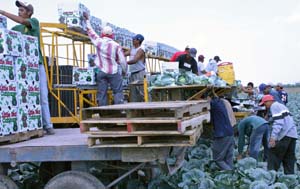Residents warned to be on the lookout for mosquitoes and flying ants, termites
Writer: Rod Santa Ana, 956-878-8317, r-santaana@tamu.edu
Contacts: Dr. Raul Villanueva, 956-968-5581, rtvillanueva@ag.tamu.edu
Dr. Juan Anciso, 956-968-5581, janciso@tamu.edu

Non-drought busting rains that fell April 28 in the Lower Rio Grande Valley have temporarily halted the harvesting of cabbage and other vegetables. (AgriLife Communications photo by Rod Santa Ana)
WESLACO – Rains that fell April 28 have temporarily slowed the harvest of citrus and vegetable crops in the Lower Rio Grande Valley and will likely increase the activity of mosquitoes and termites, according to experts at the Texas A&M AgriLife Research and Extension Center at Weslaco.
“We got anywhere from an inch to as much as 6 inches of rain Sunday,” said Dr. Juan Anciso, a Texas A&M AgriLife Extension Service citrus and vegetable specialist. “Some areas along the Rio Grande near Weslaco got the really heavy rains, but 1 inch to 3 inches of rain was more common throughout the Valley.”
In some cases the rain fell in areas that hadn’t seen rain since November, according to the National Weather Service.
“Rain is almost always a good thing for the Valley,” Anciso said. “It may have been too little too late for row crops such as cotton, corn and grain sorghum, but it will help next year’s crop by diluting the salt in the soil that builds up from irrigation water. And it’s good for ranchers’ pastures and for homeowners and their landscapes.”
The rain will have little impact on the remaining harvest of vegetables, including cabbage, carrots and onions, Anciso said. But more rain, which is not predicted, could start to deteriorate the quality of those crops.
“It’s nothing major, but soggy fields have kept most harvesters out of the field this week,” he said. “You don’t want to get mud on cabbage because they can’t be easily washed. And you want onions as dry as possible in the field, otherwise they’ll start to decay. And carrots and citrus, well, there will just be a slight delay on harvesting them until things dry out.”
Dr. Raul Villanueva, an AgriLife Extension entomologist at the Weslaco center, said people should be careful of the increase of mosquitoes the rains will likely provoke.
“Municipalities will likely increase the number of sprays for mosquitoes,” he said. “And people should do all they can to get rid of any standing water on their property to avert breeding grounds. And if you’re outdoors, use an insect repellent with the active ingredient DEET.”
Villanueva said it’s important to avoid mosquitoes because they carry dengue fever, which is prevalent just across the Rio Grande in Mexico.
“While dengue fever is not widespread in the Valley, they do have dengue fever events in Reynosa and other areas of northern Mexico,” he said. “We don’t see too much of that here because cities do a good job of spraying for mosquitoes. But it’s questionable in Mexico.”
Citrus growers also should begin sprays for the Asian citrus psyllid, Villanueva said. Psyllids are insects that can carry citrus greening, a bacterial disease not harmful to humans but which can eventually kill citrus trees.
“These rains will cause citrus trees to send out new growth called shoots which is where psyllids lay eggs and reproduce,” he said. “For some reason, psyllid populations have been high this year, so growers need to keep up with their sprays.”
Termites and ants will also show an increased activity because rain encourages the swarming behavior of these insects after winter, Villanueva said.
“People will likely observe flying ants and termites in the coming days,” he said. “Ants and termites both will fly from their mounds, mate and find new nests. Homeowners and others should be aware that if they find large numbers of winged termites or ants, they may have infestations of these insects in their dwellings.”